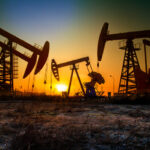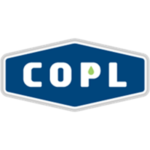“Energy prices touch everything we do.”
Wyoming is the most energy intensive state. It’s the largest U.S. coal producer, producing about 40% of total coal mined per year in the U.S. It’s the country’s eighth most productive oil state, and it’s sixth in natural gas production.
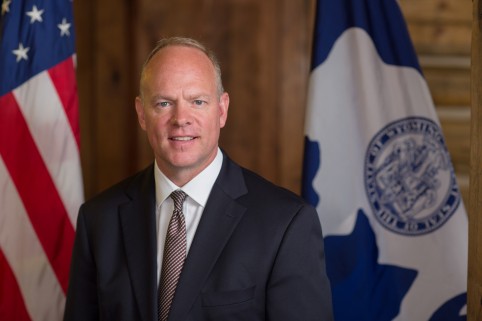
This week Oil & Gas 360® had an opportunity to talk to Wyoming Governor Matt Mead about some of the key energy related issues facing his state. Mead is a 53-year-old Wyoming native who has been at the helm in Cheyenne since 2011.
OAG360: Today we have the pleasure of speaking with Governor Matt Mead of Wyoming. Governor, we appreciate your joining us today.
WYOMING GOVERNOR MATT MEAD: Thanks for having me on. We’re always excited to talk about energy. As you know we export more energy than any other state, so I’m putting that little plug in, but you know energy is a hot topic always here in Wyoming.
OAG360: We’re going to focus for a minute on the oil and gas side of things. As you know the oil and gas industry is in the middle of a significant downturn. Prices are down about fifty percent from $90-$100 a barrel oil a year ago. Oil companies are putting the brakes on drilling operations and cutting capital budgets. Governor Mead, how is the state government there reacting to the anticipated reduction in revenue and jobs from the oil and gas industry?
GOV. MATT MEAD: Yeah, it’s a great question. If you go back a year ago, I wasn’t talking to anybody then who said a barrel of oil was going to be cut in half in terms of price and so, one is we’re trying to get a handle on, and we talk to as many people as possible on how long is this going to last. As you know it’s always a supply and demand question. I believe at least it’s a little bit of a manipulated supply and demand issue.
When you have OPEC, in particular Saudi Arabia, making some of the decisions that they’re making, which we think in part are political decisions, and that could change overnight. We just don’t know that. So first in our reaction, “How long is this going to last?” There are bright people in the industry who provide us with their best estimate of how long it is going to last.
We have over the last four years built up our rainy day fund a little more than double. We’ve built up our permanent fund during good times to a little over fifty percent and so you know this isn’t our first time in the oil and gas cycle going up and down, and so we’re prepared as a state in terms of building up our savings.
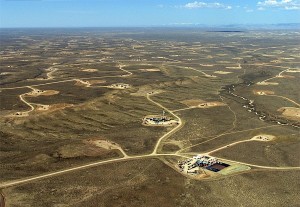
Having said that, you know it depends on volume, but roughly for every five dollars a barrel oil drops it’s about a thirty five million dollar loss to our state. And for a state that is the smallest populated with the biennial budget at about $3.3-$3.4 billion, you take fifty dollars out of oil and recognize for every five dollars that’s $35 million dollars, it is a significant hit.
That doesn’t even take into account all the collateral jobs and benefits that oil and gas provides to the state. It builds our hotels, it keeps our restaurants full, our retail stores busy, and so what we are seeing right now is we’re still seeing an actual increase in the volume of oil produced. In other words we don’t feel like we have yet felt the full brunt of the lower oil prices because as you know there’s a delay to these things. But as we prepare for our budget session next year we know we’re not going to be in as good a shape as we certainly were hoping to be in at this time last year.
OAG360: Governor what has Wyoming done in recent years to strengthen the oil and gas industry and attract investment from it?
GOV. MATT MEAD: You know one of the things that we continually hear from oil and gas companies is the burden of over-regulation, the burden of uncertainty of regulations.
One of the things I asked every agency in the state to do about a year and a half ago is to reduce their rules by about thirty percent. I think that provides greater predictability and greater ease of use of the rules without changing in large part the substance of the rules, not just for oil and gas, but for all industries. In particular with regard to oil and gas we have the Wyoming Oil and Gas Conservation Commission that has been in my mind extremely proactive in leading not just the other states but frankly leading the country in areas that have put us in a good place.
The previous administration before I came into office was in a place where they were the first ones to start dealing with hydraulic fracturing disclosures. And now you see the federal government sort of late to the game saying “hey, we need to address this.” It puts us in a good position to say, “Hey Wyoming’s already there, so stay out of that area for Wyoming because we’re way ahead of you.”
We’ve also I think done a very good job in areas that help oil and gas in the long term. We had a number of abandoned and orphaned wells in the state and we were not doing a good job of addressing those, and we’ve had a very aggressive schedule the last year and a half trying to get those plugged. And it’s interesting because that’s on the industry dime, because they pay for that to be done. But they encourage it as well because they recognize just in terms of their image, they want to do it the right way, and they do it the right way.
By the rules and regulations, I would say we have addressed everything from baseline water testing to hydraulic fracturing disclosing. We’re now looking at setbacks. I think we’ve set the table in Wyoming where the industry has said, “you know we want to do it right and we want to do it the best way possible.”
One of the challenges that we have and we’ve had my first four years in office, and I think will continue the next four, and continues to be tough is we face a lot of federal regulations that we just disagree with, and so we’ve been very active in trying to work through that in a positive way with the federal government. And when that fails, we find ourselves in the courtroom.
OAG360: In March Wyoming brought a lawsuit against the U.S. Department of Interior over the new fracing regulations. What are the optimal outcomes that you hope to achieve from that?
GOV. MATT MEAD: Well, the optimal outcome really would be for it to put us in a place where [the federal government] says, “Listen, Wyoming is years ahead of us on this and so we’re going to have a waiver that will include the entire state.”
It’s not sufficient to have it sort of piecemeal because oil doesn’t know what ground it’s under, and you can have a private piece of ground, a federal piece of ground and a state piece of ground, and there’s one area there that’s being drilled, and for consistency you don’t want to have a dual permitting process so that the oil and gas people have to go through the federal side and state side. What I would like to see is for the federal government, wherever they end up nationally, to say to Wyoming, “Hey your rules are at least as good as if not better than ours and so we’re giving the entire state a waiver with regard to the Oil and Gas Commission and your Department of Environmental Quality because your rules are already in place.”
And that will provide one set of rules–state rules–which not only provide simplicity and predictability but they also, working with the state—just by the mere difference in size between the federal government and the state government—you know when we screw it up at the state level, we can fix it in short order. We are much more nimble than the large federal government in addressing situations where we’ve not done it correctly.
And so the ultimate outcome would be just that: for the federal government to say, “hey, if we’re going to have this rule, we recognize Wyoming in particular is way ahead of us on this and we’re going to give a waiver to the entire state based upon the state rules you already have in place.”
OAG360: Turning for a minute to think about coal, Wyoming is the nation’s largest coal producing state. What do you think is a bigger threat to Wyoming, the new BLM regulations on fracing or the E.P.A. regulations on greenhouse gas emissions from power plants?
GOV. MATT MEAD: I would say the E.P.A. greenhouse gas emissions, partly because on the oil and gas side I think we’re going to be able to work through that because we’re just in such a good place. Along with greenhouse gas, add to that the mercury rule, add to that regional haze rules: it is just one on top of another. We have worked proactively in the state–we’re trying to put together an integrated test center that looks at the slipstream off a coal fired plant to see whether it can be used for a beneficial use, for example to make graphene, and tertiary oil recovery is something that has been done and we will be doing.
But I look at coal and I’m very concerned about the future of coal, not just for Wyoming but frankly for the entire country. When coal produces forty percent of electricity and you think about suppressing coal or making it prohibitively expensive, that isn’t just a loss in terms of what coal means to Wyoming but it frankly puts the country at a competitive disadvantage not to have the low cost electricity that is produced by coal that helps in manufacturing; it helps in every way because energy prices touch everything we do.
And so I’m very concerned about coal, more concerned about coal and the future of coal, than I am with the issues surrounding oil and gas, but collectively what I’m most concerned about is we believe–and I think most people in this country believe–all of us want to make sure that we’re being environmentally good stewards, that we do it the right way, that we continue to make improvements.
But there just seems to be a general failure or recognition by too many people of where their electricity comes from [and] how their cars are fueled. If you live in a world where it’s “we just want to have wind turbines,” that’s not a realistic world. And so we do believe that you need the energy mix with all of the above, but that includes coal, it includes oil and gas, and certainly includes uranium as well. These are tried and true power sources and we need to continue to use them–develop them–rather than sort of squelching them based upon what I believe is an unrealistic view of what the future will be.
OAG360: Governor, shifting just for a second to pipelines, if it’s built, how will the Keystone XL pipeline impact Wyoming, and how would it affect the state’s oil producers?
GOV. MATT MEAD: Well it’s a little hard for me to gauge in terms of the particular companies that are doing business in Wyoming that would also get a direct benefit, maybe on the back end of the XL pipeline, but we supported the pipeline even though it doesn’t go through Wyoming and even though in large part it may not be a direct benefit to our state, for a couple reasons.
One is: we are crisscrossed in this state and as are most states with pipelines; and it’s odd to me that one particular pipeline, we’re sort of reacting like this is the only pipeline that’s going to be around in this country. Two: I just firmly believe that our country, our number one trading partner, not only for the country but for our state, is Canada, and that is good for business and it’s good for the country to be able to have that pipeline built and all the benefits that come from it.
So in terms of our support for it, it wasn’t just going to be a direct benefit to the companies doing business in Wyoming or a direct benefit in a way that companies doing business are to the citizens of Wyoming. It’s my belief that it’s a benefit to the country and that it would lift all boats by having that available.
OAG360: Governor, last question. Wyoming is home to some America’s most beautiful country. Obviously you’ve got mountains, trout streams, hunting and fishing and outdoor recreation opportunities just about everywhere you look. And at the same time Wyoming is home to the nation’s top tier oil and gas and coal production and a lot of other mining and resource opportunities. How has Wyoming been able to balance environmental concerns with a vibrant natural resources sector?
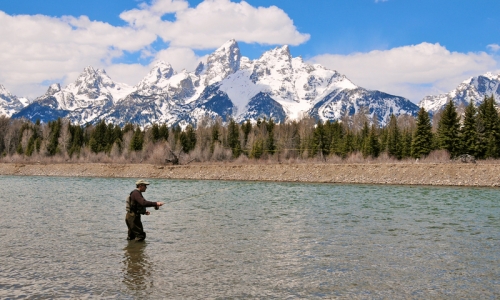
GOV. MATT MEAD: Well it’s just a great point. I mean our number one industry is minerals, and number two is tourism, and number three is ag. And so when that’s what’s on your plate you recognize how critical that balance is. We’re not going to sacrifice one for the other. And I think that the way we have done it is [that] we work very closely with industry, and this notion that somehow that industry just wants to do it wrong just isn’t the reality that we see in Wyoming.
It’s because the same people that are doing business in Wyoming–these companies–it’s the men and women who work for them that are the hunters and the fisherman, the recreationists, that enjoy having the cleanest air in the country to raise their kids in.
And so it is just as you said; it is a balance recognizing that we have long put aside the question “Do you want energy development or do you want a clean environment?” because it’s a false question. The question is we want, obviously, and we need both. Let’s find solutions that provide us both the robust energy development and a clean environment because that is Wyoming, it has been Wyoming, and it’s what we need Wyoming’s future to be. And we need all hands on deck to get us that future that we want.
Important disclosures: The information provided herein is believed to be reliable; however, EnerCom, Inc. makes no representation or warranty as to its completeness or accuracy. EnerCom’s conclusions are based upon information gathered from sources deemed to be reliable. This note is not intended as an offer or solicitation for the purchase or sale of any security or financial instrument of any company mentioned in this note. This note was prepared for general circulation and does not provide investment recommendations specific to individual investors. All readers of the note must make their own investment decisions based upon their specific investment objectives and financial situation utilizing their own financial advisors as they deem necessary. Investors should consider a company’s entire financial and operational structure in making any investment decisions. Past performance of any company discussed in this note should not be taken as an indication or guarantee of future results. EnerCom is a multi-disciplined management consulting services firm that regularly intends to seek business, or currently may be undertaking business, with companies covered on Oil & Gas 360®, and thereby seeks to receive compensation from these companies for its services. In addition, EnerCom, or its principals or employees, may have an economic interest in any of these companies. As a result, readers of EnerCom’s Oil & Gas 360® should be aware that the firm may have a conflict of interest that could affect the objectivity of this note. The company or companies covered in this note did not review the note prior to publication. EnerCom, or its principals or employees, may have an economic interest in any of the companies covered in this report or on Oil & Gas 360®. As a result, readers of EnerCom’s reports or Oil & Gas 360® should be aware that the firm may have a conflict of interest that could affect the objectivity of this report.



